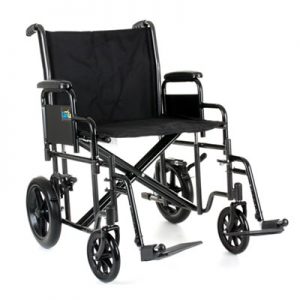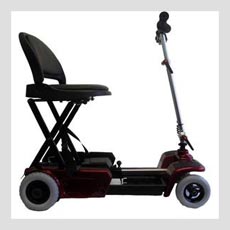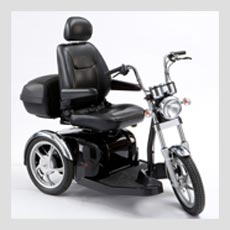When choosing a new wheelchair, users have a number of decisions to make. The biggest decision is between self-propelled or attendant propelled. Both have the advantages and disadvantages and depend on upper body strength independence needs and some other factors. Similarly, some people cannot get on with manual wheelchairs and will use an electric wheelchair. A third choice depends on your physique. In some cases, you may need a CareCo bariatric wheelchair.
 What Are Bariatric Wheelchairs?
What Are Bariatric Wheelchairs?
This is a special type of wheelchair designed for larger framed and heavier people. The word “bariatric” comes from the Greek “baros” meaning “weight” and from “iatric” which means medical treatment. CareCo bariatric wheelchairs have a greater weight capacity, are larger (wider and deeper) and use heavier support structure. They are designed for strength and durability. The typical weight range of a bariatric wheelchair caters for people of a weight 21 stone and above.
Obesity is a major cause for concern in the general population. People with physical disabilities are at greater risk purely because of the lower levels of physical exercise, particularly for the lower body. These are also useful for those recovering from long-term illness and getting back to physical health. That is why CareCo bariatric wheelchairs are so important and why we offer so much choice.
Determining Whether You Need a CareCo Bariatric Wheelchair
If you are considering whether you need a CareCo bariatric wheelchair or not, you should consider whether you fit any of the following criteria:
- You weigh 21 stone or more
- Your Body Mass Index (BMI) determines you are more than 40kg heavier than the ideal for your height
- Your body weight exceeds the working load limit
If you tick at least one of these, there is a strong chance that you need a bariatric model rather than a standard wheelchair. As you will see below, there are some great options in self-propelled, attendant-propelled and electric wheelchairs.
Featured CareCo Bariatric Wheelchairs
The following models represent a small selection of some of the fantastic bariatric models that we supply.
Minimaxx Bariatric 56
Designed with rehab patients in mind, this solid wheelchair has a maximum weight of 51 stone. Proving that a bariatric wheelchair doesn’t have to be heavy to be sturdy, this wheelchair weighs just 27kg, the typical average per person weight of luggage one is permitted when travelling for a two-week holiday. It is foldable and therefore easy to transport. The rear wheels have been carefully constructed to make it easier to push from behind.
Roma 1472 Bariatric
One of the best examples of CareCo bariatric wheelchairs, it comes in two different width choices – 20 or 22 inches. It has a lighter capacity than the Minimaxx highlighted above at just 21 stone. What it does have is a great, easy to use self-propelling mechanism, swing away footrests and heel straps. This is for those users with a little more mobility, recovering from illness or in the process of losing weight.
Enigma Energi 22 inch Bariatric Electric Wheelchair
For those with little mobility in their upper body but still require independence, the Enigma Energi 22 is a great choice. Users are always surprised at its lack of weight for a wheelchair that is both heavy-duty and electric. The frame is aluminium, one of the strongest metals available. It has a maximum weight of 180kg, which is 28 stone and 7lb or 396lb. It also offers you the choice of attendant-propelled, user propelled or dual control.
CareCo Voyager
Designed for short transportation rather than long-term use, the Voyager is the latest addition to the CareCo bariatric wheelchair range. It carries up to 32 stone in weight and folds easily to put into a vehicle. Lightweight and flexible, it is the perfect cost-effective accompaniment to your regular chair.



